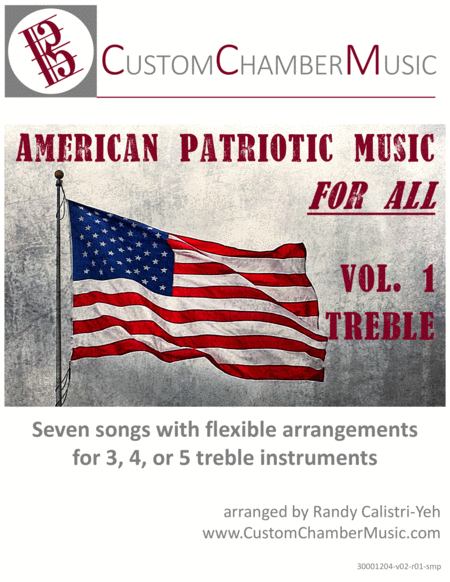Small Ensemble - Level 3 - Digital Download SKU: A0.722609 Composed by Various. Arranged by Randy Calistri-Yeh. Folk,Holiday,Patriotic,Traditional. Score and parts. 438 pages. Custom Chamber Music #4575879. Published by Custom Chamber Music (A0.722609). Volume 1 of our Patriotic collection contains four classic patriotic tunes and three complete Sousa marches. Altogether this has 15 minutes of music that both you and your audience are sure to love.This version is arranged for 3, 4, or 5 treble instruments as listed below. We also have a version for 3, 4, or 5 bass instruments, and another version with 3-7 mixed parts that can expand all the way to a full band.To demonstrate the flexibility of this collection, the audio clip has America the Beautiful performed as a clarinet quintet and a trumpet trio.The songs included in Volume 1 are:The Star-Spangled Banner (US National Anthem), by John Stafford Smith.America the Beautiful, by Samuel Ward.Battle Hymn of the Republic (Mine Eyes Have Seen the Glory).My Country, 'Tis of Thee (America, known as God Save the King/Queen in England). Stars and Stripes Forever, by John Philip Sousa.Washington Post March, by John Philip Sousa.Semper Fidelis, by John Philip Sousa.Each song is in its original key, so it is easy to combine these with your own choir or piano/organ parts.This collection contains a full score, as well as individual parts in all the appropriate clef and transposition to support the following ensembles:Brass trio, quartet, and quintet.Woodwind trio, quartet, and quintet.String trio, quartet, and quintet.Mixed trio, quartet, and quintet.Clarinet trio, quartet, and quintet.Saxophone trio, quartet, and quintet.Trumpet trio, quartet, and quintet.Viola trio, quartet, and quintet.The parts are described as follows (part ranges are given in concert pitch, where C4 is middle C):Part 1 [D4-Ab5] is the main melody. Flute/Piccolo, Oboe, Bb Clarinet, Alto Clarinet, Soprano Saxophone, Bb Trumpet, Violin, Viola.Part 2 [G3-Eb5] has some B-section melody and harmony. Bb Clarinet, Alto/Bass Clarinet, Alto Saxophone, French Horn, Bb Trumpet, Violin, Viola.Part 3 [F3-C5] is the main bass line. Bb Clarinet, Alto/Bass Clarinet, Alto/Tenor Saxophone, French Horn, Bb Trumpet, Trombone, Viola, Cello.Part 4 [G3-Bb4] is additional harmony. Bb Clarinet, Alto/Bass Clarinet, Alto/Tenor Saxophone, French Horn, Bb Trumpet, Baritone, Trombone, C/Bb Euphonium, Violin, Viola, Cello.Part 5 [E3-C5] is other harmony. Bb Clarinet, Alto/Bass Clarinet, Tenor Saxophone, French Horn, Bb Trumpet, Trombone, Viola, Cello.We recommend the following combinations:Trio: Parts 1, 2, 3.Quartet: Parts 1, 2, 3, 4.Quintet: Parts 1, 2, 3, 4, 5.Be sure to also check out our three volumes of Christmas Carols for All!
